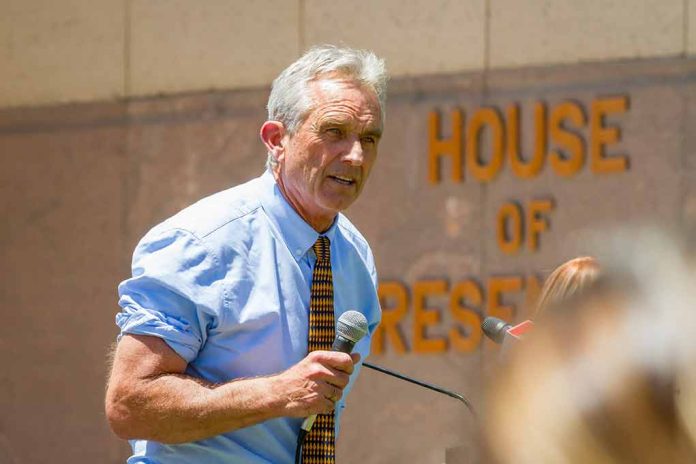
Robert F. Kennedy Jr.’s nomination as Health and Human Services Secretary signals a seismic shift in U.S. public health policy, focusing on chronic disease reduction and challenging corporate influence.
At a Glance
- President-elect Trump nominates Robert F. Kennedy Jr. as HHS Secretary.
- Kennedy plans to prioritize ending chronic disease epidemic and reducing corporate influence.
- He opposes gender-affirming care for minors, including hormone therapy and surgeries.
- He aims to remove fluoride from public water and reform FDA practices.
- He emphasizes vaccine research and informed public health decisions.
A New Direction for HHS
President-elect Donald Trump’s nomination of Robert F. Kennedy Jr. as Health and Human Services (HHS) Secretary marks a significant change in the department’s focus. Kennedy’s vision for HHS emphasizes improving American health rather than advancing what he sees as radical ideologies. His primary goals include tackling the chronic disease epidemic and freeing the department from corporate influences that have long dominated its initiatives.
Kennedy’s appointment has already sent ripples through the healthcare industry, with shares of major vaccine manufacturers like Pfizer and Moderna experiencing a decline. This reaction underscores the potential impact of Kennedy’s planned reforms on the pharmaceutical sector and public health policies.
Trump’s Nomination of RFK Jr. Signals New Era in Health Reform
President-elect Donald Trump is set to make a groundbreaking choice by nominating Robert F. Kennedy Jr. as Secretary of Health and Human Services (HHS), marking an exciting move for American healthcare. This… pic.twitter.com/PDQkXHR4Be
— Ian Ségal ✍🏻 (@segalian) November 14, 2024
Controversial Stance on Gender-Affirming Care
One of the most contentious aspects of Kennedy’s proposed policies is his opposition to gender-affirming care for minors. He plans to revoke policies promoting such care and cut funding to providers involved in these practices.
“I don’t think children can genuinely consent to repurposed castration drugs (puberty blockers) and surgical mutilation, which have permanent, irreversible effects,” said Kennedy.
This stance aligns with conservative views on the issue but has drawn criticism from medical experts who consider gender-affirming care necessary for the well-being of transgender and gender-diverse youth. The debate highlights the complex intersection of medical ethics, personal beliefs, and public policy that Kennedy will need to navigate in his new role.
Environmental Health and FDA Reform
Kennedy’s vision for HHS extends beyond gender issues to encompass broader public health concerns. He advocates for removing fluoride from public water supplies, citing potential risks to children’s cognitive development. This move aligns with his commitment to protecting Americans from harmful chemicals and pollutants, including pesticides and food additives.
A key component of Kennedy’s plan is reforming the Food and Drug Administration (FDA). He aims to end what he perceives as the FDA’s suppression of certain health treatments and address issues of corruption within the agency. This reform is part of a larger effort to refocus the HHS on genuine health improvements and informed public health decisions.
“FDA’s war on public health is about to end,” Kennedy states.
Vaccine Research and Public Health Decisions
Kennedy’s approach to vaccines has been a subject of intense scrutiny. He emphasizes the need for proper vaccine research and informed choices about vaccinations. This stance has raised concerns among public health officials who worry about potential impacts on vaccination rates and overall public health.
“We have a generational opportunity to bring together the greatest minds in science, medicine, industry, and government to put an end to the chronic disease epidemic. I look forward to working with the more than 80,000 employees at HHS to free the agencies from the smothering cloud of corporate capture so they can pursue their mission to make Americans once again the healthiest people on Earth,” Kennedy said in his response to Trump’s announcement.
As Kennedy prepares to take the helm at HHS, his vision for the department promises significant changes in U.S. public health policy. From addressing chronic diseases to reforming key agencies like the FDA, his tenure is likely to be marked by shifts in priorities and approaches to public health issues. The coming months will reveal how these proposed changes translate into policy and their impact on the health and well-being of Americans.














